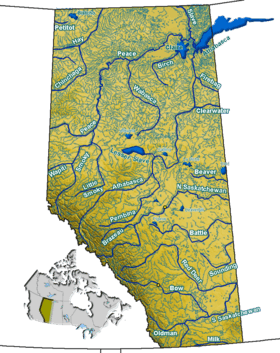Ram River
| Ram River | |
|---|---|
| Country |
|
| Physical characteristics | |
| Main source |
Ram River Glacier 2,374 m (7,789 ft) 51°53′19″N 116°10′59″W / 51.88861°N 116.18306°W |
| River mouth |
North Saskatchewan River 1,048 m (3,438 ft) 52°22′32″N 115°24′06″W / 52.37556°N 115.40167°WCoordinates: 52°22′32″N 115°24′06″W / 52.37556°N 115.40167°W |
The Ram River is a river rising in the Alberta Rocky Mountains. It flows eastward, taking on the North Ram River, before joining the North Saskatchewan River near the Town of Rocky Mountain House. The name Ram Rivulet appears on a David Thompson map of 1814. A ram is a male Rocky Mountain Sheep.[1]
The Ram River is characterized by numerous waterfalls and deep canyons throughout its course. It is first bridged by Alberta Highway 734, and again by a secondary road above its confluence with the North Saskatchewan River. Ram Falls Provincial Recreation Area is also located on the river.
Tributaries
- Hummingbird Creek
- Canary Creek, Onion Creek, Onion Lake
- Lynx Creek
- North Ram River
- Farley Lake, Kiska Creek, Joyce River, Lynch Creek, Phillip Creek, Pinto Creek
- Fall Creek
- Tawdina Creek
See also
References
- ↑ Karamitsanis, Aphrodite. Place Names of Alberta, Volume 1. (Calgary: University of Calgary Press, 1991) pg. 203.
This article is issued from
Wikipedia.
The text is licensed under Creative Commons - Attribution - Sharealike.
Additional terms may apply for the media files.
